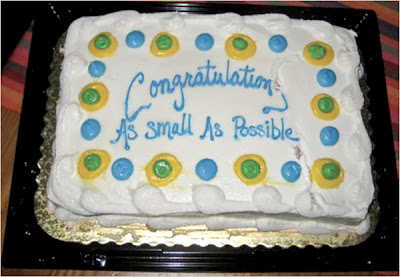Sometimes people ask dumb questions. Other times, it only seems dumb.
I was standing in line today waiting to get my new favorite lunch obsession when the woman next to me has this conversation with the cashier:
Woman: "What's the difference between the large and the small?"
Cashier: "One is bigger."
Woman: "Where is the rice? I don't see it in the picture."
Cashier: "It's hiding under the meat."
Woman: "Well, the large seems big, so two people can eat that, right?"
Cashier: "Well, I guess that depends on how hungry you are."
My face is a strange smirk listening to this, as I order my large platter (I am hungry). I think this is the funniest thing I've heard all day.
Anyways, back at the office, it occurs to me just how large the 'large' really is. And I start thinking, you know, in most other parts of the world, this really would be enough to serve two people. Maybe even more.
Just to illustrate, I spent over two hours the other day in cycling 32 miles, at vigorous effort. According to my calorimeter (I have one of them fancy bike computers that tell me this), I used up 808 calories.
This single large platter is 850 calories. Meaning, I am now +42 calories, even after my workout. (Yes, I know this isn't how this works, but you get my point.)
All of which reminds me of just how distorted our understanding of our "needs" versus our "wants" really are. Our appetite (not just for food) is an incredibly subjective thing, prone to exaggerations, distortions, and rationalizations, that we are rarely--if ever--at a good enough place to be able to distinguish our "wants" from our "needs." If we want something badly enough, it soon becomes a 'need' in our minds.
And yet there really are 'needs' out there that we can actually do something about.
Something to think about as we get ready for Christmas again.









